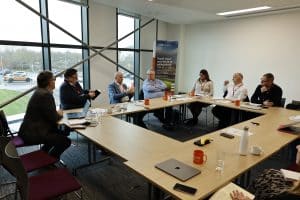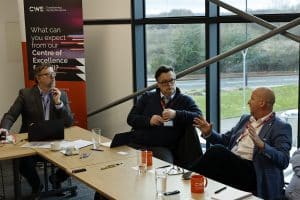Life at CWE – Commercial Decisions That Keep The Trains Running
26th January, 2026
At CWE, we’re proud to be part of the UK rail industry. We believe it’s a great place to work and that our
6th February, 2023
As an industry, it feels like skills and the coming shortage has been something we’ve all been talking about now for a while. Talking being the key word. And that’s fantastic – it means that together we’re all raising awareness of the issue, and there’s universal agreement that it’s a problem.
But, as the statistics show, time is of the essence. All of us in the industry can feel the problem looming, but the starkest scientific picture of it was painted in 2019 by a City & Guilds and National Skills Academy for Rail (NSAR) report. The paper’s headline finding was that up to 120,000 additional people will be required by 2030, with demand for skills peaking around 2025.
One of the problems with statistics like this that concern the future – not just in rail, but wherever you find them – is the temptation to think “ah, 2030, that’s ages away.” Especially when more immediate concerns like the cost of living and energy crises are hanging over us. But 2030 isn’t as far away as we’d like to think. Consider this, seven years going backwards was the EU referendum.
Luckily, seven years is enough time to do something if we act now. And that’s exactly what CWE Ltd is doing with our Talent Track campaign.
The challenge

The numbers from City & Guilds paint a stark picture and lay bare the scale of the skills shortage in rail. You may have seen them before but they really do underline the sense of urgency that’s required:
Skills campaign – the time is now
At CWE, we’re passionate about the industry we are a part of, and we’re committed to doing what we can to employ apprentices and showcase the variety of options a career in rail can provide. And as a former apprentice myself, it’s something that I personally feel strongly about. That’s why we want to put our hand up and lead a collective effort to convince the next generation, and those from all backgrounds, that choosing rail will give them the pride and career satisfaction they seek – only then will we solve the looming skills crisis.
That’s why earlier this month we took action, bringing together several leading experts from both academia and the rail industry to debate what the barriers are to rail as a career choice and what needs to be done to overcome these challenges.
This – at least – gives us a starting point. How can we tackle a problem if we don’t know exactly what the problem is?
How, what, where, why – the experts
We were absolutely delighted that professionals from across the sector took the time to discuss this important issue with us, and grateful to both the National College of Advanced Transport and Infrastructure (NCATI) in Doncaster for hosting us and Nigel Wordsworth from Rail Business Daily for facilitating. Along with myself, we were joined by John Hall of Davis Wagon Services, Christine Fernandes of CAF and Women in Rail, Will Rogers from East Midlands Railway, NCATI’s Alec Gillham, and Barry Smith who’s the Head of Assessment and Skills at the National Skills Academy for Rail (NSAR).

The range of participants made for a useful, robust discussion and debate on relevant issues around the relationship between academia and the industry, attracting apprentices and talent into the sector and encouraging greater diversity. We also debated some of the shorter-term impacts the economy might be having as well as whether or not rail has an image problem.
When it came to diversity, one point that really stood out, from Alec Gillham, was: “I know good undergraduates, very skilled people who wouldn’t consider rail because it’s not the right environment for them as it doesn’t look like them.”
This is a concerning anecdote, and with the City & Guilds and NSAR research showing lower numbers of women, young adults and people from BAME backgrounds would consider a rail career, it’s a clear area of focus.
We also established the critical need for a clear path for young people getting into rail. At CWE, we get involved with local schools and academies, we do the jobs and careers events – but it needs a higher level plan. And there was broad agreement that the challenging economic and changing political situations are hitting progress. As Barry put it: “For a long time now, we’ve struggled with the absence of a clear industrial strategy. And, we’re still not sure what the plan for rail is – we’re all waiting.”
But we can’t wait for much longer. That’s why I’m so grateful to my colleagues from across the industry for taking part in this roundtable event. We’ve gotten the ball rolling and the report, which will be published shortly, contains some clear next steps from learning from other sectors, to engaging the wider workforce.
Now it’s up to us to keep this momentum going – we believe rail is a desirable and rewarding career for young people and those from all backgrounds. The time for action is now – all aboard the Talent Track.
26th January, 2026
At CWE, we’re proud to be part of the UK rail industry. We believe it’s a great place to work and that our
22nd January, 2026
✨ Wrapping Up 2025: A Year of Growth, Learning & Momentum ✨ As 2025 comes to a close, we reflect on the milestones,

12th November, 2025
After the huge success of last year’s charity bake sale, the CWE team decided to make it an annual tradition —